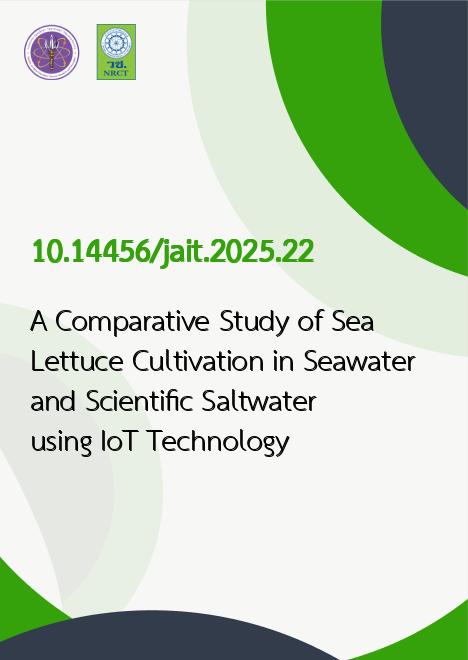
|
A Comparative Study of Sea Lettuce Cultivation in Seawater and Scientific Saltwater using IoT Technology |
|---|---|
| รหัสดีโอไอ | |
| Creator | Suttipong Klongdee |
| Title | A Comparative Study of Sea Lettuce Cultivation in Seawater and Scientific Saltwater using IoT Technology |
| Contributor | Sriwaree Sujaritchai, Sommart Promput |
| Publisher | Faculty of Informatics, Mahasarakham University |
| Publication Year | 2568 |
| Journal Title | Journal of Applied Informatics and Technology |
| Journal Vol. | 7 |
| Journal No. | 2 |
| Page no. | 363-374 |
| Keyword | Cultivation, Internet of Things, Sea Lettuce, Smart Agriculture, Temperature Control |
| URL Website | https://ph01.tci-thaijo.org/index.php/jait |
| Website title | Journal of Applied Informatics and Technology |
| ISSN | 3088-1803 |
| Abstract | Ulva Rigida, known as sea lettuce, is a variety of marine algae that exhibits a high degree of cultivation feasibility. Sea lettuce offers numerous health benefits and is increasingly being considered as a future food source that could promote commercial cultivation. However, challenges arise in assessing the feasibility of utilizing seawater appropriately, which could be addressed by incorporating the Internet of Things (IoT) into this study. This research aims to investigate and compare the growth of sea lettuce between seawater and scientific saltwater using IoT based on temperature-controlling systems. The IoT-enabled sea lettuce cultivation system can record and display real-time data using Arduino Nano. The results show that the scientific saltwater closely approximates the properties of seawater during the 21-day cultivation period. Sea lettuce cultivated in seawater exhibited greater growth and weight gain compared to cultivation in scientific saltwater. The average weight gain per day was 3.27 grams for seawater cultivation and 2.83 grams for scientific saltwater cultivation, indicating a difference of 0.44 grams. These experimental results demonstrate the feasibility of using scientific saltwater, which exhibits properties resembling seawater. Cultivating with scientific saltwater facilitates ease of cultivation and eliminates the need for coastal locations. Additionally, it has the potential to reduce pollution in marine environments. |